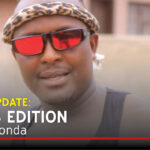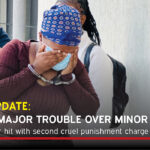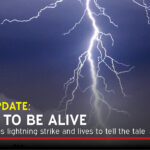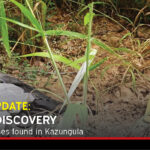42-year-old Onica Lekuntwane was recently appointed the coordinator of Journey of Hope Botswana.
Their message is simple: Touch. Look and Check (TLC) (Tshwara. Leba. Tlhatlhoba).
As Botswana joins the world in commemorating Breast Cancer awareness month this October, for Journey of Hope Botswana it coincides with the launch of a National Awareness Campaign titled ‘Go moDiatlengTsaGago’.
The initiative is about de-stigmatising breast cancer and taking one’s health into their own hands, literally.
The campaign features a number of breast cancer fighters and survivors, who agreed to be photographed topless and share their inspiring stories.
These ladies range in age from the early 30s to the 70s – key target populations who are increasingly being affected by breast cancer.
The Voice reporter SHARON MATHALA sat down with Lekuntwane for a brief tete-a-tete ahead of next week’s campaign launch set for October 10.
For those who have never come across Journey of Hope, please tell us a little bit about the organisation.
Journey of Hope Botswana is a non-profit organisation that focuses on breast cancer awareness.
It was started in 2009 by Bev Denbury, Rita Keevil and Marilyn Garcin in response to their realisation that many women were unaware of the signs of breast cancer and that there was a lot of value in being able to detect the signs early to avoid unnecessary deaths.
What inspired you to join such a cause?
Like many others, l used to have a very big fear of the word ‘Cancer’.
I realised that this fear was due to my own ignorance about it.
When I got the chance to meet some of ‘the Pink Ladies’ – we dress in pink and ride pink scooters – I got the chance to ask all the burning questions l used to have.
I realised that it was my chance to join them as a volunteer and help to share this new knowledge.
I am a strong believer in using my skills to make a difference in society.
With my Visual Communication and Adult Education background, I am grateful to have this opportunity to make a difference.
Interesting. So, what exactly is your role with the organisation?
As of September, I am the Coordinator of Journey of Hope Botswana.
Before then I had been involved in doing the PR, design work and public education.
My current role is a combination of my previous roles, advocacy and fund-raising.
The organisation turns 10 this year – what are some of your achievements?
Our biggest achievement is getting breast cancer awareness on the tips of people’s tongues in villages throughout Botswana.
Every year we embark on an awareness drive to clinics, kgotlas and hospitals throughout Botswana – teaching men and women about the signs of breast cancer, and how to conduct a self-examination at home.
Through this ‘Big Journey’ we have teamed up with local nurses and doctors and managed to conduct over 10, 000 free breast examinations.
Impressive stuff! So, what does breast cancer mean to you?
Breast cancer is a disease that has made me realise the importance of making healthier choices in life and taught me to appreciate the gift of life.
Whilst it can be hereditary, studies have shown that our lifestyle choices play a big role in the rise in statistics.
What are some of the challenges you have encountered?
Perception. In the formative years of JOHB, most of the volunteers and riders were Caucasian.
This led people to assume that it was an organisation of white women for white women.
This could not be further from the truth.
We are a Botswana-based NGO for Batswana.
What is the biggest life lesson you have learnt whilst with a Journey of Hope?
Gratitude. I have connected with men and women from all corners of Botswana, during my teachings about breast cancer.
The hard part is losing some of them to breast cancer, because they delayed to get treatment.
So I have learnt to treasure every ‘thank you’ and to not take my own health for granted.
Delving deeper, breast cancer cases appear to be on the rise. Why do you think this is?
Yes, indeed. According to the recently released National Health Strategy, breast cancer and cervical cancer remain the leading causes of cancer deaths in Botswana.
Whilst genetics and age are known causes of breast cancer, it has now been classified as a non-communicable disease, because it is caused by our lifestyle choices.

Name five vital health tips that should be followed by all.
- Do not smoke
- Exercise regularly
- Cut down on eating processed foods
- Cut down on your intake of sugar and fat
- Check any changes to your breasts with your doctor.
The focus in Botswana over the years has predominantly been HIV/AIDS but breast cancer is beginning to dominate conversations. How much of a threat is the disease in the country?
Breast cancer (and other non-communicable diseases) definitely dominate health conversations now.
This is because without changing our lifestyle choices, even manageable diseases like HIV/AIDS become a challenge.
Roughly how many lives are lost to breast cancer in Botswana every year?
Whilst we do not have the exact statistic, what we can state is that lives are lost to breast cancer because about 70 percent of the patients only come to the hospital when they are in the latter stages of the disease.
This is because they are unaware of the earlier signs as they are usually not painful.
Signs such as?
The most common one is a breast lump that grows gradually.
You can also get a nipple discharge, your one breast may grow larger than the other and even change colour.
It can also present itself as a rash or an open sore that does not heal.
Most of these signs are painless, so most people ignore them.
When someone is diagnosed with breast cancer, typically what is the next step? What does the treatment involve?
At JOHB we usually assist the men and women that we meet during our Big Journey.
We send them to Bokamoso Private Hospital for a breast Ultrasound and Mammogram.
If the scan results show a suspicious lump, this is followed by another test called a Biopsy.
If the results are positive, we help the patients to get appointments at the Breast Clinic, at Princess Marina Hospital.
This is where they will get examined again by a team of doctors and given their treatment plan.
This is usually a combination of Chemotherapy, Surgery and Radiotherapy.
We also help the patients to connect to other cancer Fighters, through a support group called The Fighters Support Group.
It is often assumed that breast cancer only affects females. Are men not at risk too?
Good point. Breast cancer affects both men and women.
This is because both men and women have breasts.
The breast area includes the underarm (legwafa) and chest (sehuba).
So if you notice any changes in the appearance of these areas of your body, go and see your doctor.
No matter whether you are a man or woman.
Tell us about the upcoming campaign?
We are excited about our upcoming campaign ‘Go moDiatlengTsaGago’ which features breast cancer fighters and survivors sharing why they chose to take their breast health in their own hands.
We hope that seeing, reading and hearing the stories of real breast cancer heroes and heroines will encourage people to take responsibility for their own health.
What else do you do besides your Journey of Hope work?
Because of my love for children and passion for issues of culture and identity, I am also known as ‘MmaagweRati’.
Under this pseudonym I write and illustrate edutainment content for children under the Rati and Friends brand.
Thank God It’s Friday, what will you be up to this weekend?
I love my family time so I will be drawing with my son! He is so much into that!
Twitter: @sharonmathala
Email: sharonm@thevoicebw.com



















